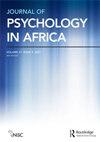谁的生活满意度和生活意义更高?加纳人口特征和福祉的混合方法探索
IF 0.8
4区 心理学
Q3 PSYCHOLOGY, MULTIDISCIPLINARY
引用次数: 0
摘要
本研究考察了加纳环境中年龄、性别、宗教实践和生活水平的人口统计学特征与生活满意度和生活意义之间的关系。参与者为394名加纳城市成年人(女性=43.90;平均年龄=40.84岁,SD=11.20岁)。参与者完成了一份社会人口学问卷、生活满意度和意义生活测量,以及一个关于幸福感的开放式问题。定量数据分析采用线性回归和多变量方差分析(MANOVA),定性数据分析采用专题分析。结果表明,生活水平可以预测生活满意度和生活意义的存在。在一项事后分析中,在生活水平低于平均水平的群体中,意义的存在远远大于生活满意度。从定性研究结果中,我们观察到生活水平低于平均水平的群体广泛提及幸福感的享乐概念。我们的研究结果表明,有必要制定经济政策来改善人口物质福利,以提高发展中国家的生活满意度和生活意义。本文章由计算机程序翻译,如有差异,请以英文原文为准。
Who does better on life satisfaction and meaning in life? A Mixed-methods exploration of demographic characteristics and well-being in Ghana
The present study examined the relationship between the demographic characteristics of age, sex, religious practice, and standard of living with life satisfaction and meaning in life in a Ghanaian setting. Participants were 394 Ghanaian urban adults (female = 43.90; mean age = 40.84 years, SD = 11.20 years). Participants completed a socio-demographic questionnaire, life satisfaction and meaning life measures, as well as an open-ended question on well-being. Linear regression and multivariate analysis of variance (MANOVA) were employed for the quantitative data analysis and thematic analysis for the qualitative data analysis. Results revealed that living standards predicted life satisfaction and presence of meaning in life. In a post hoc analysis, presence of meaning was much greater than life satisfaction among the group with below average standard of living. From the qualitative findings, we observed that the group with below average standard of living referred extensively to hedonic conceptualisations of well-being. Our findings suggest a need for economic policies to improve population material well-being in order to enhance life satisfaction and meaning in life in a developing country setting.
求助全文
通过发布文献求助,成功后即可免费获取论文全文。
去求助
来源期刊

Journal of Psychology in Africa
PSYCHOLOGY, MULTIDISCIPLINARY-
CiteScore
1.70
自引率
16.70%
发文量
62
期刊介绍:
Findings from psychological research in Africa and related regions needs a forum for better dissemination and utilisation in the context of development. Special emphasis is placed on the consideration of African, African-American, Asian, Caribbean, and Hispanic-Latino realities and problems. Contributions should attempt a synthesis of emic and etic methodologies and applications. The Journal of Psychology in Africa includes original articles, review articles, book reviews, commentaries, special issues, case analyses, reports and announcements.
 求助内容:
求助内容: 应助结果提醒方式:
应助结果提醒方式:


